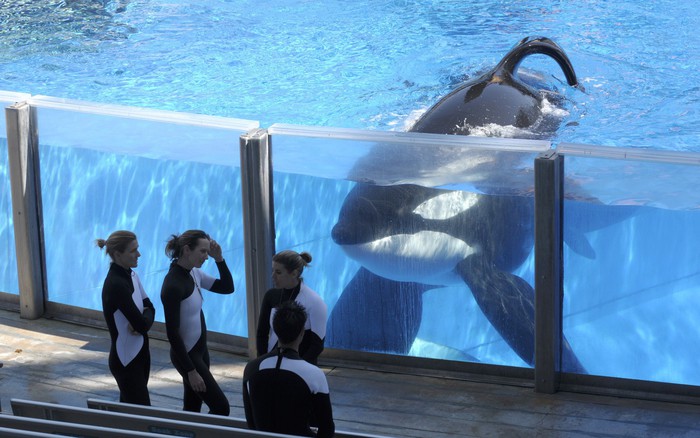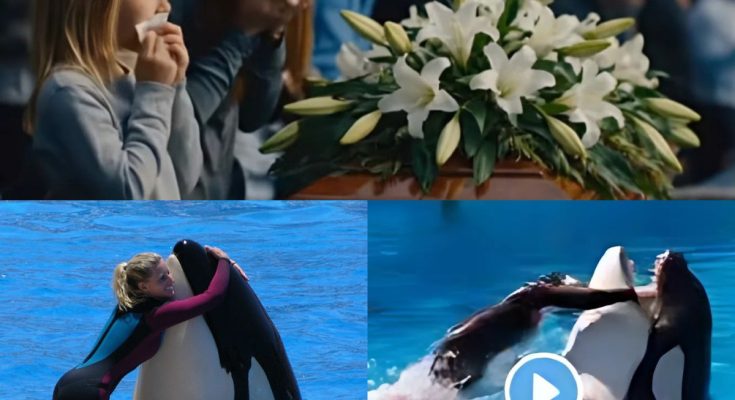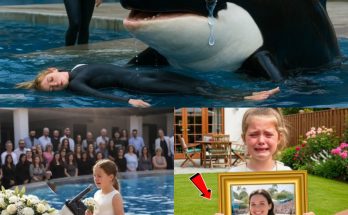A Stage Built on Trust
For decades, the sight of a trainer diving fearlessly into the water alongside a massive killer whale was one of the most captivating acts in marine entertainment. These performances were marketed as more than shows — they were proof of harmony between human and nature. Trainers would stand on the whales’ backs as they surged through the pool, launch into the air from the force of a tail flick, and share moments of seeming intimacy — a quick hand signal, a nose nudge, a splash that made the audience laugh.
Behind the scenes, these connections were built through years of daily interaction. Trainers fed, cared for, and swam with the whales, learning to interpret subtle signals — a flick of the dorsal fin, a shift in body position, the tone of a vocalization. They knew the animals’ moods, quirks, and preferences. In return, the whales learned to respond to human cues with precision and, seemingly, affection.
To the public, it was a fairytale of trust. To the trainers, it felt like friendship.
The Day It All Changed
But on one otherwise ordinary day, the magic shattered. In front of a packed audience, a killer whale turned on its trainer. What began as a routine sequence — a synchronized swim, a splash, an elegant jump — spiraled into chaos within seconds.
The whale lunged, grabbing the trainer with immense force. The water churned violently, waves crashing against the glass walls of the pool. Gasps from the crowd turned into screams. Onlookers were frozen, some unable to process what they were seeing.
For the people who worked there, it was every trainer’s nightmare come true — a moment they had been trained for, but one they hoped would never arrive. Emergency teams rushed to intervene, but the raw strength of a 6-ton predator left them nearly powerless.

Why It Happened
In the days and weeks after, the question lingered: Why would a whale, seemingly so close to its human partner, attack without warning?
Animal behaviorists pointed to the complex emotional lives of orcas. In the wild, these apex predators roam up to 100 miles in a single day, live in tight family pods, and engage in sophisticated social play. In captivity, their world shrinks to a concrete tank. While they may adapt to training, their instincts and needs do not disappear.
Long-term stress, boredom, social isolation from other orcas, and the unnatural demands of performance can manifest in unpredictable — and sometimes violent — ways. “It’s not betrayal,” one expert explained. “It’s a breaking point. Even the most patient, conditioned animal can snap when its natural life is restricted for too long.”
A Legacy of Loss
The incident left deep scars — emotional, professional, and societal. The trainer’s colleagues lost not only a friend but also their sense of safety. For the audience members who witnessed it, the image of that violent moment would be burned into memory forever.
t also sparked a wave of criticism toward the marine entertainment industry. Activists renewed calls to end orca captivity. Documentaries and investigative reports exposed the hidden struggles of performing whales. Public opinion began to shift, and what was once considered magical entertainment was increasingly viewed as exploitation.
Several facilities announced they would no longer breed killer whales or train them for theatrical tricks. But for many, these changes came too late — the bond between humans and these magnificent predators had already been fractured beyond repair.

A Cautionary Tale
Today, the story of that fateful performance serves as both a tragedy and a warning. It reminds us that the line between cooperation and danger in human-animal relationships is razor-thin. Trust, no matter how strong, cannot erase the fundamental truth of nature: wild animals are not — and never will be — domesticated companions.
Respecting that truth may be the only way to prevent future tragedies. For the killer whale, that means the open ocean, the company of its own kind, and a life lived on its own terms. For humans, it means letting go of the fantasy that nature will always bend to our will.



